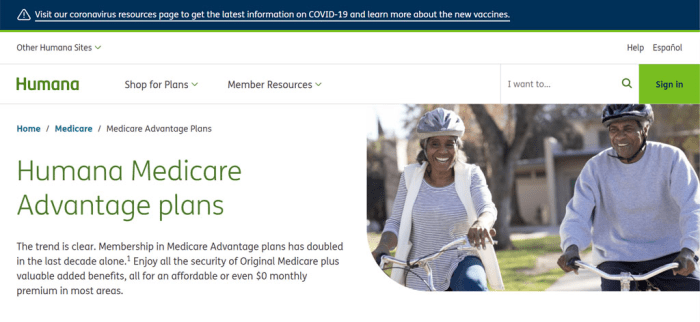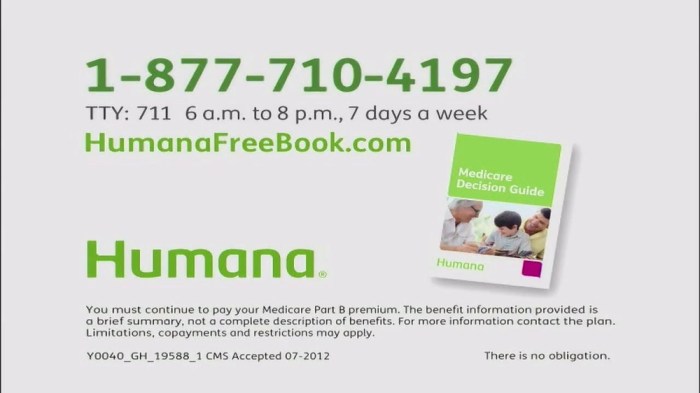Humana health insurance Medicare supplement plans offer a crucial safety net for seniors navigating the complexities of healthcare. Understanding these plans, however, requires navigating a maze of options, costs, and provider networks. This guide cuts through the confusion, offering a clear look at Humana’s Medicare Supplement offerings, helping you determine if they’re the right fit for your needs and budget.
From deciphering plan types and coverage details to comparing costs and understanding the claims process, we’ll arm you with the knowledge to make informed decisions about your health insurance. We’ll also explore how Humana’s plans stack up against competitors, ensuring you get the best possible value for your hard-earned money. Get ready to decode the world of Medicare supplements and find the plan that empowers you to prioritize your health.
Humana Medicare Supplement Plan Overview
Navigating the world of Medicare can feel like deciphering a complex code, but understanding Humana’s Medicare Supplement plans can simplify the process. These plans, also known as Medigap plans, help cover some of the out-of-pocket costs associated with Original Medicare (Parts A and B). They are sold by private insurance companies like Humana, and they work alongside Original Medicare, not instead of it. Choosing the right plan depends heavily on your individual needs and budget.
Humana Medicare Supplement Plan Types and Coverage
Humana offers a range of Medicare Supplement plans, each denoted by a letter (A, B, C, etc.). These plans aren’t standardized across all insurance providers; the specific benefits offered under each letter can vary slightly depending on the insurance company. However, generally speaking, plans with higher letter designations tend to offer more comprehensive coverage, which usually translates to higher premiums. It’s crucial to carefully review the specific details of each plan offered by Humana in your area to determine which best fits your individual healthcare needs and financial situation. Humana’s website and their customer service representatives are excellent resources for obtaining this information.
Comparison of Humana Medicare Supplement Plans
The following table compares three common Humana Medicare Supplement plans. Remember that specific premium amounts and plan details can vary based on your location and other factors. Always confirm current pricing and benefits directly with Humana.
| Plan Name | Monthly Premium (Range) | Coverage Highlights | Out-of-Pocket Maximum |
|---|---|---|---|
| Humana Plan G | $100 – $300 (Example Range) | Covers most Medicare Part A and Part B coinsurance, hospital costs, and some foreign travel emergency coverage. Does not cover Part B deductible. | Varies; check plan documents. |
| Humana Plan F | $150 – $400 (Example Range) | Covers most Medicare Part A and Part B coinsurance, hospital costs, and Part B deductible. May include foreign travel emergency coverage. | Varies; check plan documents. |
| Humana Plan N | $75 – $200 (Example Range) | Covers most Medicare Part A and Part B coinsurance and hospital costs. Has a copay for some doctor visits and a copay for emergency room visits. Does not cover Part B deductible. | Varies; check plan documents. |
Humana Medicare Supplement Plan Enrollment Process
The enrollment process for a Humana Medicare Supplement plan involves several steps. First, you’ll need to determine your eligibility. You must be enrolled in both Medicare Part A and Part B. Next, you’ll need to compare plans offered in your area and select the one that best suits your needs and budget. Humana offers various resources, including their website and customer service representatives, to help you with this process. Once you’ve chosen a plan, you’ll need to complete an application and provide any necessary documentation. After Humana approves your application, your coverage will begin. It’s essential to carefully review all plan documents before enrolling to fully understand your benefits and responsibilities. You may want to consult with a licensed insurance agent for personalized guidance.
Cost and Affordability of Humana Medicare Supplement Plans: Humana Health Insurance Medicare Supplement
Navigating the world of Medicare supplements can feel like deciphering a complex code, especially when it comes to understanding the costs. Humana offers a range of Medicare Supplement plans, and the price you pay will depend on several key factors. Knowing what influences these costs is crucial for making an informed decision that fits your budget.
Choosing the right Humana Medicare Supplement plan requires careful consideration of several factors that significantly impact the monthly premium. Understanding these factors empowers you to make a choice that aligns with your financial situation and healthcare needs.
Factors Influencing Plan Costs
Several key elements determine the cost of your Humana Medicare Supplement plan. Your age, location, and even your health status all play a role. Generally, older individuals tend to pay higher premiums than younger ones, reflecting the increased likelihood of needing healthcare services. Geographic location also impacts pricing; premiums can vary significantly from state to state due to differences in healthcare costs and provider networks. While Humana doesn’t use your health status to determine eligibility for a plan, your pre-existing conditions might indirectly affect your choice and overall cost by influencing your healthcare utilization and therefore your out-of-pocket expenses.
Premium Variations by Plan Type and Location
The table below illustrates how monthly premiums can vary depending on the specific Humana Medicare Supplement plan (Plan G and Plan N are examples) and your state of residence. These are hypothetical examples and actual premiums will vary based on several factors and should be verified directly with Humana.
| Plan Type | State A (e.g., Florida) | State B (e.g., California) | State C (e.g., Texas) |
|---|---|---|---|
| Plan G | $150 | $200 | $175 |
| Plan N | $120 | $160 | $140 |
Budgeting for a Humana Medicare Supplement Plan
Let’s consider a hypothetical budget for a senior citizen, Mrs. Smith, who is 70 years old and lives in State A (Florida). She receives a Social Security income of $2000 per month. Her other monthly expenses include:
* Rent: $1000
* Utilities: $200
* Groceries: $400
* Transportation: $100
* Other expenses: $100
Her total monthly expenses before considering the Medicare Supplement plan are $1800. If she chooses Plan G ($150), her total monthly expenses would be $1950, leaving her with $50 remaining. If she opts for the less expensive Plan N ($120), she would have $80 remaining. This hypothetical example highlights the importance of carefully reviewing your budget and comparing the cost of different plans to find one that best suits your financial circumstances. Remember to factor in potential unexpected healthcare costs and to adjust this budget as needed to reflect your personal circumstances.
Network of Providers and Access to Care
Choosing a Medicare Supplement plan hinges significantly on the breadth and accessibility of its provider network. Humana’s Medicare Supplement plans offer access to a vast network of healthcare professionals, but understanding the specifics is crucial for ensuring you can readily access the care you need. This section clarifies the network’s composition and how to navigate it effectively.
Humana’s Medicare Supplement plans don’t operate on a strict “network” model in the same way that HMOs do. Instead, they offer broader access to doctors and hospitals that accept Medicare assignment. This means that while you’re not limited to a specific network, you’ll generally receive the best value (i.e., lower out-of-pocket costs) when you see providers who accept Medicare assignment. Finding these providers is key to maximizing your plan’s benefits.
Finding In-Network Doctors and Hospitals
Humana provides several resources to help you locate participating providers. Their website features a provider search tool where you can input your location and specialty to identify doctors and hospitals accepting Medicare assignment within your area. The tool usually provides contact information, addresses, and sometimes even patient reviews. Additionally, Humana’s customer service representatives are readily available via phone to assist with provider searches and answer any questions you might have about accessing care. Many Humana plans also provide directories that are mailed to members, offering a convenient offline resource.
Comparison of Humana’s Network to a Competitor (AARP)
Direct comparison of network sizes between Humana and competitors like AARP is challenging because neither uses a traditional, restricted network. Both plans primarily cover doctors and hospitals that accept Medicare assignment. However, the *perceived* accessibility might differ based on geographical location and individual experiences. For example, while both might have extensive coverage in densely populated urban areas, rural areas might have fewer participating providers in either network. The best way to assess the network’s suitability for your needs is to use the provider search tools of both Humana and AARP and compare the results for your specific location and desired specialties. Individual experiences, such as personal recommendations from friends or family who use either plan, could also influence the perceived accessibility of each network.
Claims Process and Customer Service

Source: affordablehealthinsurance.com
Navigating the claims process is a crucial aspect of any health insurance plan, and Humana’s Medicare Supplement plans are no exception. Understanding how to file a claim and what to expect from their customer service can significantly impact your experience. This section details the steps involved in filing a claim, provides examples of common claim scenarios, and shares insights from user reviews regarding Humana’s customer service.
Filing a claim with Humana for a Medicare Supplement plan is generally straightforward. Humana offers various methods for submitting claims, including online portals, mail, and fax. The specific steps may vary slightly depending on the chosen method, but the core information required remains consistent.
Submitting a Claim
Typically, you’ll need to provide your Humana member ID number, the provider’s information (name, address, NPI number), details of the services rendered (dates, type of service, and associated charges), and any supporting documentation like receipts or explanation of benefits (EOB) forms from your healthcare provider. Humana’s website and member materials provide detailed instructions for each submission method, including downloadable forms. For example, if you received physical therapy, you’d submit the bill from the physical therapist, ensuring all necessary information is included. For a doctor’s visit, you’d submit the bill from the physician’s office, again with complete information.
Common Claim Scenarios and Resolutions
Understanding how to handle different claim situations can save you time and frustration. For instance, if a claim is denied, you’ll need to understand the reason for the denial and how to appeal the decision. Humana’s website usually provides details on common denial reasons, such as missing information or exceeding coverage limits. If your claim involves a specialist or out-of-network provider, you might need to provide additional documentation to justify the necessity of the care. In cases of discrepancies between the billed amount and the amount Humana pays, you should carefully review the EOB to understand the payment calculation and contact Humana’s customer service if you have questions.
User Reviews and Testimonials on Humana’s Customer Service, Humana health insurance medicare supplement
User experiences vary, and it’s essential to consider a range of perspectives. Below is a summary of common themes found in online reviews regarding Humana’s customer service for Medicare Supplement plans:
- Many users praise the availability of multiple contact channels, including phone, online chat, and email, offering flexibility in reaching customer support.
- Some users report positive experiences with helpful and responsive customer service representatives who effectively addressed their concerns and resolved their issues.
- Conversely, other users describe difficulties in reaching a representative, long wait times, and less-than-satisfactory resolutions to their problems. These experiences often involve complex claims or disputes.
- The ease of using the online portal and mobile app for managing claims and communicating with Humana is frequently highlighted as a positive aspect of the customer service experience.
- A common suggestion is to be prepared with all relevant information before contacting customer service to expedite the resolution process.
Comparing Humana to Other Medicare Supplement Providers

Source: forbes.com
Navigating Humana’s Medicare supplement plans can feel like a maze, but securing the right coverage is key to peace of mind. Planning for your health needs often involves considering other important aspects of financial security, such as comparing independent car insurance quotes to ensure you’re getting the best rates. Returning to Humana, remember to factor in your individual needs and budget when choosing a plan for optimal coverage and financial stability.
Choosing a Medicare Supplement plan can feel like navigating a maze, especially with so many providers offering similar-sounding plans. Understanding the nuances between them is crucial to finding the best fit for your individual needs and budget. This section compares Humana’s Medicare Supplement offerings with those of two other major providers, highlighting key differences and helping you make an informed decision.
Humana, AARP, and UnitedHealthcare Plan Comparison
The Medicare Supplement market is competitive, with Humana, AARP (often partnered with UnitedHealthcare), and UnitedHealthcare being major players. Direct comparison requires considering specific plan types available in your area, as offerings vary geographically. The following table provides a generalized comparison, highlighting key features and customer ratings (note that ratings fluctuate and should be independently verified on sites like the Better Business Bureau or consumer review platforms).
| Provider Name | Plan Type | Key Features | Customer Ratings (Example – Verify Independently) |
|---|---|---|---|
| Humana | Various (e.g., Plan G, Plan N) | Wide network, online tools, potentially strong customer service, various plan options to suit different budgets and needs. | 3.8 out of 5 stars (Example – This is a hypothetical rating) |
| AARP (UnitedHealthcare) | Various (e.g., Plan G, Plan F) | Large network, established reputation, potentially extensive customer service resources, strong brand recognition. | 4.2 out of 5 stars (Example – This is a hypothetical rating) |
| UnitedHealthcare | Various (e.g., Plan G, Plan N) | Broad network, diverse plan options, potentially robust online tools and resources, strong national presence. | 4.0 out of 5 stars (Example – This is a hypothetical rating) |
Advantages and Disadvantages of Choosing Humana
Humana offers a wide range of plans, often providing options to suit different budgets. Their online tools and resources can be user-friendly, simplifying tasks like managing claims. However, the breadth of their plans can also make the selection process more complex. Customer service experiences can vary, and some users report challenges reaching representatives or resolving issues. Network coverage can also vary by plan and location.
Scenarios Favoring Humana or Competitors
A retiree prioritizing affordability and a strong online experience, and comfortable navigating a range of plan options, might find Humana’s diverse plan offerings and digital tools appealing. However, a retiree valuing a consistently high level of customer service and a readily available customer support team might prefer AARP or UnitedHealthcare, which often boast strong customer service reputations, although this can vary by region and individual experience. Someone requiring extensive coverage in a specific geographic area should carefully compare the network access offered by each provider before selecting a plan. A person with complex medical needs might find it beneficial to compare the specific benefits and exclusions of each provider’s plan carefully.
Understanding Humana’s Medicare Advantage Plans (brief comparison)

Source: ispot.tv
Humana offers both Medicare Supplement and Medicare Advantage plans, providing seniors with choices to fit their individual needs and budgets. Understanding the key differences between these plans is crucial for making an informed decision about your healthcare coverage. While both help cover Medicare costs, they do so in fundamentally different ways.
Medicare Supplement plans (also known as Medigap plans) are designed to supplement Original Medicare (Parts A and B), helping cover the out-of-pocket costs that Medicare doesn’t. Medicare Advantage plans, on the other hand, are “all-in-one” plans that replace Original Medicare, offering coverage for Part A (hospital insurance), Part B (medical insurance), and often Part D (prescription drug coverage).
Key Distinctions in Coverage and Cost
Humana’s Medicare Supplement plans offer standardized coverage across various plans (A through N), with each letter representing a different level of coverage. These plans help pay for Medicare-approved services, including doctor visits, hospital stays, and other medical expenses. The cost of a Medicare Supplement plan varies depending on the plan letter and your location, but generally involves a monthly premium in addition to your Medicare Part B premium. There are usually no networks to consider with Medigap plans.
Humana’s Medicare Advantage plans, conversely, often include additional benefits not covered by Original Medicare, such as vision, hearing, and dental coverage. These plans usually have a monthly premium, but they may also have a lower out-of-pocket maximum than Original Medicare. However, you’ll need to use providers within their network to get the most out of your plan. Costs vary significantly based on the specific plan and benefits included.
Humana Medicare Supplement Plan vs. Humana Medicare Advantage Plan
| Feature | Humana Medicare Supplement Plan | Humana Medicare Advantage Plan |
|---|---|---|
| Type of Plan | Supplemental; covers gaps in Original Medicare | Replaces Original Medicare; all-in-one coverage |
| Coverage | Helps pay for Medicare-approved services; standardized coverage levels (A-N) | Covers Part A, B, and often Part D; may include extra benefits (vision, dental, etc.) |
| Network | No network restrictions | Requires using in-network providers for full coverage |
| Cost | Monthly premium (in addition to Medicare Part B premium); predictable out-of-pocket costs | Monthly premium; may have lower out-of-pocket maximum, but costs can vary widely |
Final Thoughts
Choosing the right Medicare Supplement plan is a big decision, impacting your financial well-being and access to quality healthcare. By understanding the nuances of Humana’s offerings, comparing them to competitors, and carefully considering your individual needs and budget, you can confidently navigate the Medicare landscape. Remember, proactive planning and informed choices are key to securing your health and financial future. So, take the time to explore your options, ask questions, and make a decision that empowers you to live your best life, worry-free.
